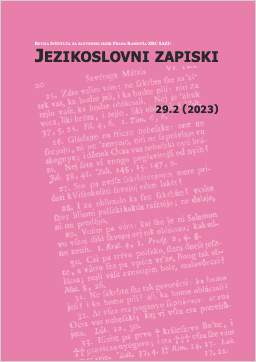The Usability of an American Online Learner’s Dictionary from the Point of View of Slovenian Users
DOI:
https://doi.org/10.3986/JZ.29.2.07Keywords:
raba slovarjev, uporabniki slovarjev, iskanje po slovarju, kakovost slovarskih razlag, ponazarjalno gradivoAbstract
This article first presents research into various aspects of dictionary use. This is followed by a report on a qualitative study of dictionary use at the School of Economics and Business, University of Ljubljana, during which students were given look-up tasks with the
online Britannica Dictionary. The study results provide insight into the efficacy of the specific dictionary used. The students’ comments demonstrate that they have very firm ideas and high expectations about the type of information they wish to receive in a dictionary, and how they prefer to have it delivered.
Downloads
References
Arhar Holdt 2018 = Špela Arhar Holdt, Odnos jezikovnih uporabnikov do splošnih enojezičnih slovarjev: slovenski vidik, Slovenščina 2.0 6.1 (2018), 1–36. DOI: http://dx.doi.org/10.4312/slo2.0.2018.1.
Barnhart 1962 = Clarence L. Barnhart, Problems in editing commercial monolingual dictionaries, v: Problems in lexicography, ur. Fred W. Householder – Sol Saport, Bloomington: Indiana University, 1962, 161–181.
Béjoint 1994 = Henri Béjoint, Tradition and innovation in modern English dictionaries, Oxford: Clarendon Press, 1994.
Béjoint 2010 = Henri Béjoint, The lexicography of English, Oxford: Oxford University Press, 2010.
de Schryver – Prinsloo 2011 = Gilles-Maurice de Schryver – Danie J. Prinsloo, Do dictionaries define on the level of their target users? A case study for three Dutch dictionaries, International Journal of Lexicography 24.1 (2011), 5–28. DOI: doi.org/10.1093/ijl/ecq045.
Dziemianko 2014 = Anna Dziemianko, On the presentation and placement of collocations in monolingual English learners’ dictionaries: insights into encoding and retention, International Journal of Lexicography 27.3 (2014), 259–279. DOI: doi.org/10.1093/ijl/ecu012.
Farina idr. 2019 = Donna M. T. Cr. Farina – Marjeta Vrbinc idr., Problems in online dictionary use for advanced Slovenian learners of English, International Journal of Lexicography 32.4 (2019), 458–479. DOI: doi.org/10.1093/ijl/ecz017.
Gouws 2014 = Rufus H. Gouws, Article structures: moving from printed to e-dictionaries, Lexikos 24 (2014), 155–177. DOI: doi.org/10.5788/24-1-1256.
Hannabuss 1996 = Stuart Hannabuss, Research interviews, New Library World 97.5 (1996), 22–30. DOI: doi.org/10.1108/03074809610122881.
Hatherall 1984 = Glyn Hatherall, Studying dictionary use: some findings and proposals, v: LEXeter ’83 proceedings, ur. Reinhard Rudolf Karl Hartmann, Tübingen: Max Niemeyer, 1984, 183–189.
Herbst 1996 = Thomas Herbst, On the way to the perfect learners’ dictionary: a first comparison of OALD5, LDOCE3, COBUILD2 and CIDE, International Journal of Lexicography 9.4 (1996), 321–357. DOI: doi.org/10.1093/ijl/9.4.321.
Kosem idr. 2018 = Iztok Kosem – Sascha Wolfer idr., Attitudes of Slovenian language users towards general monolingual dictionaries: an international perspective, Slovenščina 2.0 6.1 (2018), 90–134. DOI: https://doi.org/10.4312/slo2.0.2018.1.90-134.
Lew 2011 = Robert Lew, Space restrictions in paper and electronic dictionaries and their implications for the design of production dictionaries, 2011, https://repozytorium.amu.edu.pl/bitstream/10593/799/1/Lew_space_restrictions_in_paper_and_electronic_dictionaries.pdf.
Lew – de Schryver 2014 = Robert Lew – Gilles-Maurice de Schryver, Dictionary users in the digital revolution, International Journal of Lexicography 27.4 (2014), 341–359. DOI: https://doi.org/10.1093/ijl/ecu011.
Lorentzen – Theilgaard 2012 = Henrik Lorentzen – Liisa Theilgaard, Online dictionaries – How do users find them and what do they do once they have?, v: Proceedings of the 15th EURALEX international congress, ur. Ruth Valtvedt Fjeld – Julie Matilde Torjusen, Oslo: Department of linguistics and Scandinavian studies, University of Oslo, 2012, 654–660.
Qu – Dumay 2011 = Sandy Q. Qu – John Dumay, The qualitative research interview, Qualitative Research in Accounting & Management 8.3 (2011), 238–264. DOI: https://doi.
org/10.1108/11766091111162070.
Stabej idr. 2008 = Marko Stabej – Tadeja Rozman idr., Jezikovni viri pri jezikovnem pouku v osnovni in srednji šoli: končno poročilo z rezultati projekta, Ljubljana: Pedagoški inštitut, 2008.
Tomaszczyk 1979 = Jerzy Tomaszczyk, Dictionaries: users and uses, Glottodidactica 12 (1979), 103–119.
Vrbinc – Vrbinc 2004 = Alenka Vrbinc – Marjeta Vrbinc, How do Slovene learners of English use their dictionaries?, Linguistica 44 (2004), 131–160.
Vrbinc – Vrbinc 2005 = Marjeta Vrbinc – Alenka Vrbinc, Future professional dictionary users and their use of dictionaries, Acta neophilologica 39.1–2 (2005), 139–152.
Wingate 2002 = Ursula Wingate, The effectiveness of different learner dictionaries, Tübingen: Max Niemeyer, 2002.
Downloads
Published
How to Cite
Issue
Section
License

This work is licensed under a Creative Commons Attribution-ShareAlike 4.0 International License.
Authors guarantee that the work is their own original creation and does not infringe any statutory or common-law copyright or any proprietary right of any third party. In case of claims by third parties, authors commit their self to defend the interests of the publisher, and shall cover any potential costs.
More in: Submission chapter





